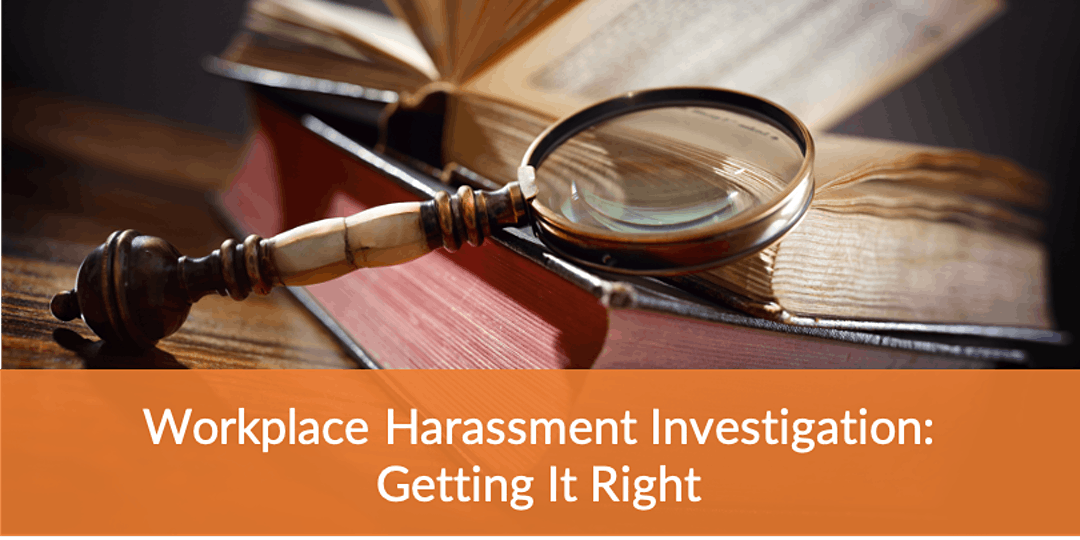-
Advocacy Theme
-
Tags
- Abortion
- Adoption
- Caregiving
- CEDAW
- Disability
- Domestic Violence
- Domestic Workers
- Harassment
- Healthcare
- Housing
- International/Regional Work
- Maintenance
- Media
- Migrant Spouses
- Migrant Workers
- Muslim Law
- National budget
- Parental Leave
- Parenthood
- Polygamy
- Population
- Race and religion
- Sexual Violence
- Sexuality Education
- Single Parents
- Social Support
- Sterilisation
- Women's Charter
23 October 2020: Workplace Harassment Investigation – Getting It Right [Catalyse]
September 25th, 2020 | Events, Gender-based Violence, News, Workplace Harassment
You’ve just received a workplace harassment complaint. What do you do?
- Who needs to get involved?
- What questions to ask during interviews?
- What are the company’s responsibilities and obligations to the employees?
Investigating workplace harassment complaints can sometimes feel like walking a tightrope over a ravine with no safety net underneath. A poorly handled investigation often makes matters worse, and may result in toxic work environment, reputational damage, trial by public opinion and even legal disputes.
Join Catalyse as it takes you through an investigation journey using case studies led by experienced lawyers and anti-harassment consultants. Practice your skills and learn from your peers through group discussions and role play.
Reduce the anxiety launching an investigation as you learn:
- Best practices in conducting an investigation
- The most common pitfalls to avoid
- Recommended list of interview questions.
At the end of this workshop, you will gain confidence in handling workplace harassment investigations by:
- Understanding the essential steps for an investigation
- Identifying the informal and formal options for resolving a harassment complaint
- Knowing how to conduct interviews
- Exploring the disciplinary and appeal process
- Learning best practices for an investigation that build trust within the organisation
Content breakdown
- Legal considerations to avoid common pitfalls. Insights on having clearly defined policies and procedures, small business recommendations, data protection; non-privileged and privileged information, recommended terminology (e.g. reporter versus complainant); and confidentiality.
- Receiving complaints. Understand the options to resolve complaints—ranging from misconduct that the reporter may want to resolve informally to a prompt and neutral investigation.
- Step 1: Responding to an official complaint. Key stakeholder mapping and exploring the elements of a good first response.
- Step 2: Fact-finding. Preparing to fact-find and the factors to consider (venue, order of interviews, selecting interviewers).
- Step 3: Conducting interviews. Step-by-step process to gather information to substantiate the allegations.
- Step 4: Writing the report. What to include/exclude and the differences between substantiated and unsubstantiated claims.
- Step 5: Sharing the report findings with key stakeholders. Considering written and verbal options.
- Disciplinary hearing and appeal. Understand the role and function of the disciplinary hearing and appeals processes.
- Communicating the outcome. Clarifying the outcome to the appropriate stakeholders and understanding the importance of confidentiality.
- Life after. Ensuring learning and corrective actions are taken.
- Complying with the law. Reporting requirements and seeking legal counsel.
- Q&A
“This has been an insightful and interactive session. Great to hear solid advice from the experts as well as good experience sharing from fellow practitioners. Highly recommended!”
– Lim Siew Fern, Head of HR, ENGIE Services Singapore
Who should attend?
HR professionals, in-house counsel, senior managers, employers (including SMEs), disciplinary committees and anyone who may be involved in workplace harassment investigations.
Date: Friday, 23 October 2020
Time: 10a.m. – 4p.m. (with lunch in between)
Venue: Online (via Zoom)
Fee: $567.21
Register here!
Facilitators
Caroline Callow
Senior OD Facilitator and Content Lead, Catalyse
Corinna Lim
Executive Director, AWARE; former Partner at Allen & Gledhill and KhattarWong
Sabina Sudan
Lawyer (India/ New York/ Arizona); Consultant; Adj. Prof, former Ethics and Compliance professional (GSK/Abbott)




